South Korean Director Wins the PALME d’Or: BONG JOON-HO
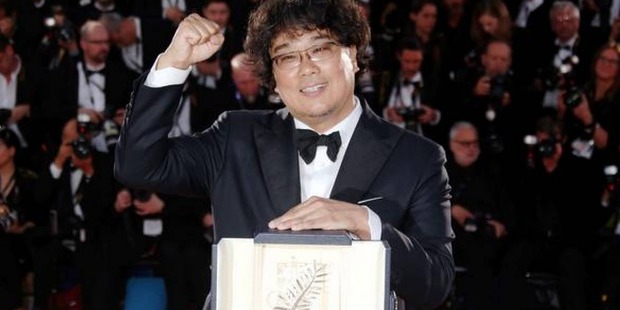
South Korean film ‘Gisaengmul’ / ‘Parasite’ became the first ever Korean film to win the prestigious Palme d’Or at the 2019 Cannes Film Festival. Considered as the highly prestigious award, South Korean film director Bong Joon-ho won the top prize Palme d’Or at the Cannes Film Festival. It marks a new leaf for the South Korean film industry and history. The significance is remarkable considering ‘Gisaengmul’ / ‘Parasite’ is Bong Joon-ho’s seventh feature film of his career.
As is the wont of any award ceremony, there will always be unsatisfied critics, who would be unhappy with the main award. Cannes Film Festival certainly is not any different from the Oscars or else the Emmy or the BAFTA. Majority of international cinema critics were expecting that Cannes would make history by honoring a female filmmaker, who had picked Celine Sciamma’s ‘Portrait of a Lady on Fire’ for the prestigious Palme d’Or.
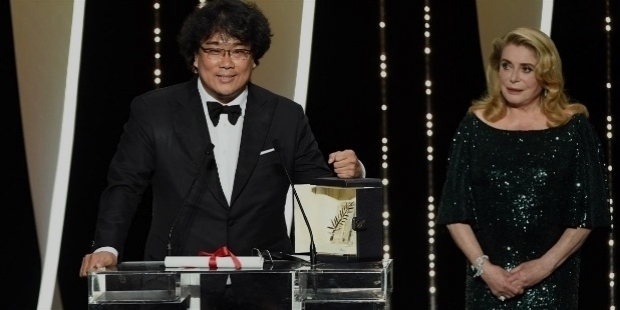
Cannes Film Festival has awarded the Palme d’Or prize to only one female filmmaker in its 73 years of history so far. New Zealand’s Jane Campion is the only female filmmaker, who had won the Palme d’Or in 1993 for her film ‘The Paino’. Cannes Film Festival has been rocked for this unfair treatment towards world’s female filmmakers. It is ironical and sad that the male-dominated Cannes jury has dominated the proceedings for Palme d’Or 72:1 in favour of male filmmakers.
GISAENGMUL / PARASITE:
Bong Joon-ho’s Korean film ‘Gisaengmul’, ‘Parasite’ in English, wrote a new leaf in Korean Cinema history by winning the Palme d’Or at the 2019 Cannes Film Festival. ‘Gisaengmul’ became the first ever Korean film to win the Palme d’Or at the Cannes Film Festival. The nine-member jury chose Bong Joon-ho’s masterpiece unanimously.
‘Gisaengmul’ aka ‘Parasite’ is a strident social satire, which captures the essence and tricks of a poor family of hustlers. The dark comedy depicts the shameless lifestyles of the rich. The film stars Song Kang-ho, Lee Sun-kyun, Cho Yeo-jeong, Choi Woo-shik and Park So-dam in pivotal roles. Bong Joon-ho masterfully captures a closer look of social realism spiced with dark satire and thriller elements. Interestingly, Joon-ho creates his morally flawed monsters in ‘Gisaengmul’ entirely human. He described his creation as a comedy without clowns and a tragedy without villains.
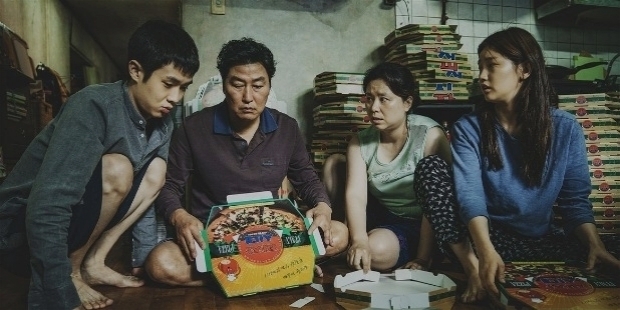
The film is slated for a 30th May 2019 release in South Korea. Bong Joon-ho shows the class-war subtext concrete with a bloody struggle for survival, which leaves no one holding the moral high ground in the film. Jury President Alejandro Inarritu disclosed, “We shared the mystery of the unexpected way ‘Parasite’ took us through different genres, speaking in a funny, humorous and tender way of no judgement of something so relevant and urgent and so global.”
Winning the Palme d’Or, Bong Joon-ho enthused, “It is the 100th anniversary of the cinema in Korea this year. To celebrate the 100th anniversary of the Korean Cinema, I think the Cannes Film Festival has offered me a very great gift.” Interestingly, this is the second consecutive year for an Asian director to win the Palme d’Or. Last year, Japanese filmmaker Hirokazu Kore-eda had won the Palme d’Or for ‘Manbiki kazoku’ / ‘Shoplifters’.
‘Gisaengmul’ aka ‘Parasite’ was the ultimate favourite and greatly enjoyed by the Cannes critics. They had lobbied hard and anticipated the film would win the Palme d’Or in spite of the tough competition by other films. Bong Joon-ho is not new to the Cannes Film Festival. In the year 2017, Joon-ho’s ‘Okja’ received a four-minute standing ovation at the Cannes Film Festival. The film was nominated for the Palme d’Or.
Early Life:
Bong Joon-ho was born in Daegu, South Korea on the 14th of September 1969. Passionate about films from his early childhood, Little Bong decided he wanted to become a filmmaker while he was still in his middle school. His childhood passion was not easy to convince his parents. Having being born in a family of high academics and career-oriented members, Bong majored in Sociology from the Yonsei University. His interest in films made him a member of the Film Club at the University. Bong was greatly influenced by Edward Yang, Hou Hsiao-hsien and Shohei Imamura.
Father Bong Sang Gyun worked as a Graphic Designer. His maternal grandfather Park Tae Won was a renowned author, who had written the famous book ‘A Day in the Life of Novelist Gubo’. Elder brother Joon Soo works as a Professor and teaches English Literature in the Seoul National University. Elder sister Jee Hee is a Fashion Designer. Bong Joon-ho has had a highly intellectual upbringing.
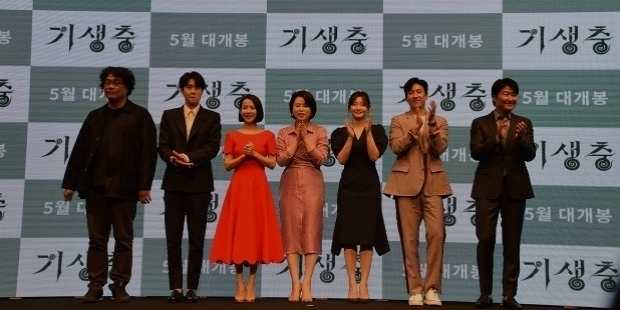
Bong Joon-ho was destined towards greatness in the world of cinema. During the early years of 1990, Bong joined the Korean Academy of Film Arts and completed a two-year program. During the course period, Joon-ho made many 16mm short films. Two of his graduation films ‘Memory within the Frame’ and ‘Incoherence’ were invited at the Vancouver and Hong Kong International Film Festivals.
Bong Joon-ho collaborated with his classmates on several projects, prominent among them was his friend Jang Joon-hwan’s highly acclaimed short film ‘2001 Imagine’. He collaborated as the Cinematographer in various interesting projects. He also worked as Lighting Director. Bong Joon-ho is a creative and talented filmmaker from his early years of filmmaking.
The Journey of Success:
Bong Joon-ho assisted multiple directors in various capacities to learn the tricks of the trade. In the year 1996, he got his first ‘partial screenplay credit’ for the film titled ‘Seven Reasons Why Beer is Better than a Lover’. In the year 1997, Bong worked as the Screenplay Writer and Assistant Director in Park Ki-yong’s film ‘Motel Cactus’. In the year 1999, Bong was one of the four writers, who were credited for the screenplay of ‘Phantom – The Submarine’.
Bong Joon-ho’s first feature film titled ‘Barking Dogs Never Bite’ as the writer-director was released in the year 2000. The film was produced by Cha Seung-jae, with whom Bong had worked during ‘Motel Cactus’ and ‘Phantom – The Submarine’. ‘Barking Dogs Never Bite’ was invited at the San Sebastian International Film Festival in Spain. The film won awards at the Slamdance and Hong Kong Film Festivals.
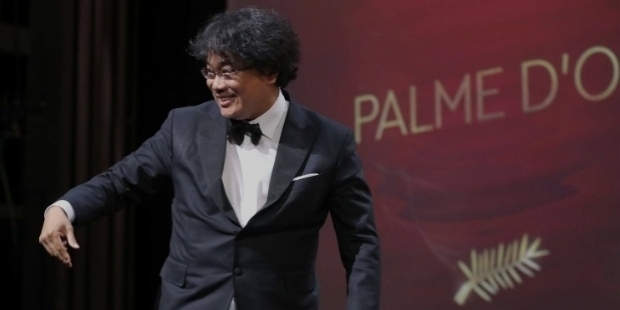
In the year 2003, Bong Joon-ho released his second film ‘Memories of Murder’. He adopted the play about a real-life serial killer, who had terrorized a rural town during the 1980s. The large-scale project was well-received by critics and audience alike. It became a huge success and rescued Cha Seung-jae’s nearing-bankruptcy production company SIDUS. ‘Memories of Murder’ won multiple awards including the ‘Best Picture’, ‘Best Director’, ‘Best Actor’ and ‘Best Lighting’ at the 2003 Grand Bell Awards.
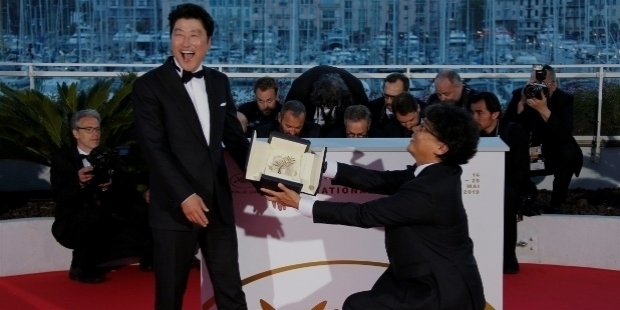
At the San Sebastian International Film Festival in Spain, Bong Joon-ho picked up three awards, including the ‘Best Director’ award for ‘Memories of Murder’. The film was well-received in France and the United States. Soon after his huge success, Bong Joon-ho took a break to contribute short films and wrote ‘Antarctic Journal’ in 2005.
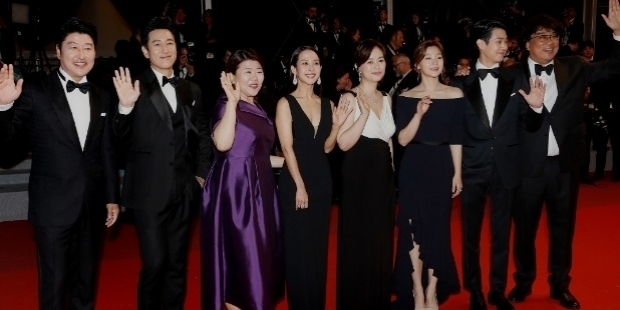
In the year 2006, Bong Joon-ho presented the big-budget film ‘The Host’. The film revolved around the fictional monster, which creates havoc in Seoul. At the 2006 Cannes Film Festival, ‘The Host’ was premiered in the Director’s Fortnight section. It was a huge hit and was widely released in South Korea with as many as 1,800 screens showing ‘The Host’. It was a huge box-office success and created a new box-office record for Bong Joon-ho. The film’s worldwide success made Universal Studio to buy its remake rights.
In the year 2008, Bong joined with French directors Michel Gondry and Leos Carax to direct one of the three segments of a film titled ‘Tokyo’. The short film was about three separate tales of the city. Bong’s segment was titled ‘Shaking Tokyo’, which depicts a man, who lives his life as a ‘hikikomori’. The segment captures the tribulations of a man, who never leaves his home because he is unable to adjust to the norms of the society.
In 2009, Bong Joon-ho wrote and directed his fourth film ‘Mother’. The film depicts the struggle of a mother, who tries hard to save her disabled son from a murder accusation. The film was premiered at the 2009 Cannes Film Festival and was critically acclaimed. It was well-received at various international film festivals and became a big success.
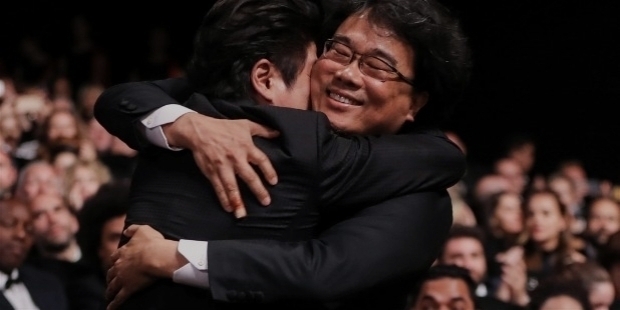
In the year 2011, 21 filmmakers joined hands to make the short film titled ‘3.11 A Sense of Home’. The film captures the devastating earthquake and tsunami effects, which hit the Tohoku region in Japan on the 11th of March 2011. Bong Joon-ho’s segment titled ‘Iki’ captures the emotions of a teenage girl, who finds a toddler on a beach. ‘3.11 A Sense of Home’ was screened on the first anniversary of the catastrophic disaster.
Bong Joon-ho’s stature as an international filmmaker of repute speaks volume of his short career span. At the 27th Sundance Film Festival, Bong Joon-ho served as a jury member. At the 2011 Cannes Film Festival, he was selected to Head the Camera d’Or section. In 2013, he was one of the jury members at the 2013 Edinburgh International Film Festival.
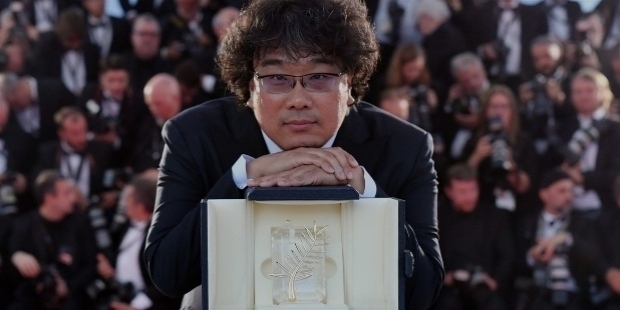
In 2013, Bong Joon-ho released his first English film titled ‘Snowpiercer’. The film was based on Jean-Marc Rochette and Jacques Lob’s graphic novel ‘Le Transperceneige’. The film was a big hit worldwide. Bong released ‘Okja’ in 2017. The film was premiered at the 2017 Cannes Film Festival and competed for the Palme d’Or. The film received a four-minute standing ovation for its creativity. The film was described as a miracle of imagination and technique.
- Full Name :
- Bong Joon-ho
- Zodiac Sign :
- Virgo
- Birth Place :
- Daegu
South Korea
- Occupation :
- Filmmaker
- Industry :
- Entertainment









